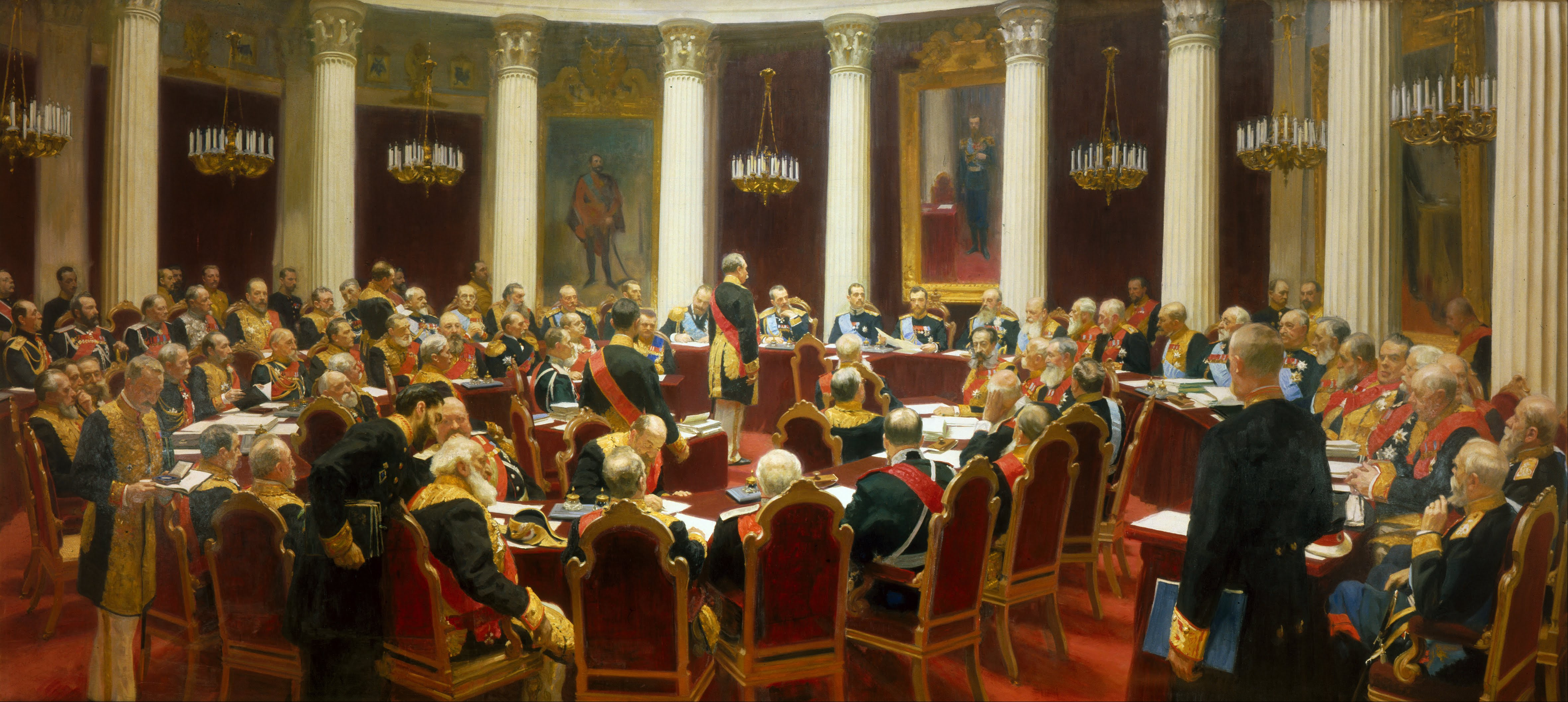

An artists rendition of a Court Martial trial after the Chrysant War


The 11th of February 305 AC saw the Emperor end the tenure of the shortest Regalian Government, the second Privy Council, and instituted the New Model Government. The New Model Government would maintain a Privy, but remove all executive powers and vest them into the Ministers. At the same time, the Emperor lowered the executive power of the Ministers to seize more absolute power as monarch, while creating new Ministries to fill certain roles. Some Ministers have transitioned to the new Ministerial positions, while some were fired.
The Regalian Law Ministry was one such body created by Emperor Cedromar I. Managed by Dietrich Drache, the Ministry is responsible for the hiring and firing of Generals and Admirals, the running of the Empire's Military Courts, and the oversight of the Military Laws of the Realm.



Held by: Dietrich Drache @FireFan96
The Ministry is headed by the War Minister, who has the following rights:
The right to appoint and fire Generals and Admirals
The right to run the Military Courts and lesser Military Judges
The right to nullify and modify existing Military Laws
The right to Lodge for new Military Laws
The War Minister is also able to appoint his own clerks and aides, which are listed below.

Held by: Christopher Black @Film_Noir
The Naval Clerk is advisor to the War Minister on all things related to the Navy and maritime matters. He is also responsible for presiding during Court Martials involving the Navy.

Held by: Vulmar Ravenstad @Tiber_
The Army Clerk is advisor to the War Minister on all things related to the Army and land matters. He is also responsible for presiding during Court Martials involving the Army.

Held by: Otto Bergmann-Jäger @Infinatum
The Military Tribune is an investigator of sorts for the War Ministry. His primary duty is to ensure military law is followed by those affected by it. As such, he is usually the one to gather evidence for the Military Court to use for a Court Martial.
Secondly, the Military Tribune serves as the Sergeant-at-Arms of the Military Court, and enforced the discipline of those attending a Court Martial.



Held by:
Christopher Black
Erwald Ravenstad
The Admirals command the various Armadas of the Imperial Navy. They receive their commissions from the War Minister, and their ships and crews from the Logistic Minister.

Held by:
Domenico Alferi
Hamelin d'Vaud
Wolfram Kehlen
Garth Viduggla
The Generals command the various land armies of the Imperial Army. They receive their commissions from the War Minister, and their armies from the Logistic Minister.


The Military Courts are Court Martials for military blundering and violations of military law and military negligence. Known for their strict proceedings and even harsher punishments, the Military Court is the most feared judicial body by every soldier. In the entire history of its existence, only two individuals have ever been found not guilty, leading to many unruly soldiers falling strictly in line.
Unlike the traditional Regalian Judiciary, the Military Court functions much more straightforward in its proceedings. A trial is presided over by a Military Tribunal, which can consist of the War Minister, their Navy/Army clerk, and other military officers.
The following is a summarized process for a court martial.
- An individual is summoned to a court martial by the Ministry of War. This can be done either by request of an offending officer, of the Ministry itself.
- The Tribunal lists the accounts of military law violations or counts of military negligence to the defendant.
- The defendant pleads either guilty or not guilty. In practice, this is merely a formality as the Tribunal always assumes a guilty verdict.
- The Presiding Tribunal will begin questioning the defendant on every military charge listed. The defendant after every charge may respond to the changes, convincing the Tribunal that they were innocent, or showing why they deserve a lesser punishment.
- After all charges have been addressed, the Tribunal calls for a recess where they decide the fate of the defendant.
- After the recess, the final verdict is issued and carried out.
The Military Court takes their Court Martials with strict adherence to protocol. The defendant is required to remain completely silent unless spoken to. This silence is also enforced onto any individuals who are watching the trial, military or not. Even the slightest whisper can be held in contempt of court, and for this reason most Court Martials are closed door proceedings open to military personal only.
Court Martials will usually be called if a commanding officer performs poorly during a World Progression Event. However, military officers (on or off commission) may also call for Court Martials in the city by filling out the following application. Note that calling someone out for a military violation is a serious matter, and the Military Court does not look kindly to individuals that constantly send in minor complaints.
Court Martials will usually be called if a commanding officer performs poorly during a World Progression Event. However, military officers (on or off commission) may also call for Court Martials in the city by filling out the following application. Note that calling someone out for a military violation is a serious matter, and the Military Court does not look kindly to individuals that constantly send in minor complaints.
I, <Rank> <Name> call the dishonorable <Rank> <Name> to Military Court for violation of the following:
@tag the person you are accusing:
Provide a short concise sentence to explain what they are being charged with
-Sub-Bullet (Desertion)
-Every Separate (Insubordination to a Superior Officer)
-Charge (Unkempt Uniform)
@tag the person you are accusing:
Provide a short concise sentence to explain what they are being charged with
-Sub-Bullet (Desertion)
-Every Separate (Insubordination to a Superior Officer)
-Charge (Unkempt Uniform)
Last edited:





